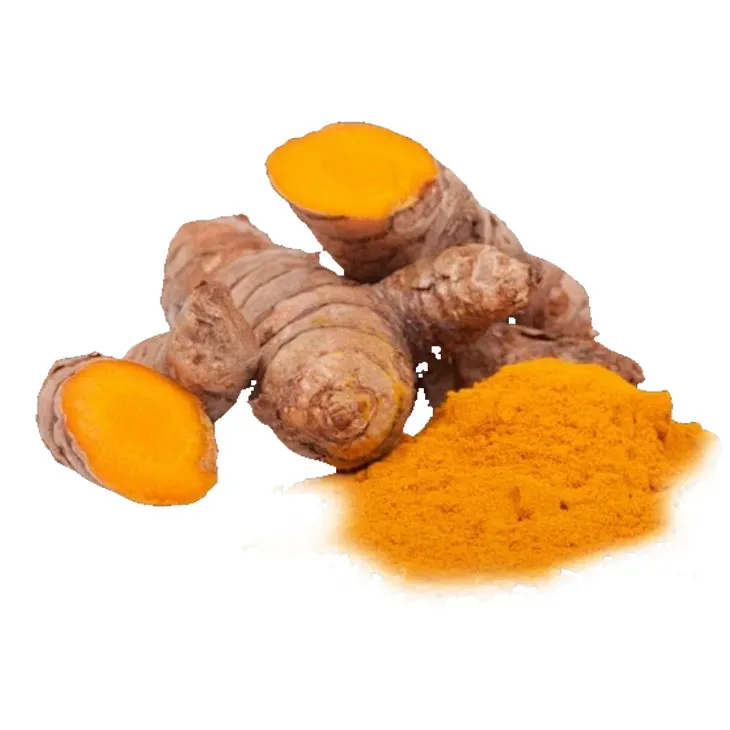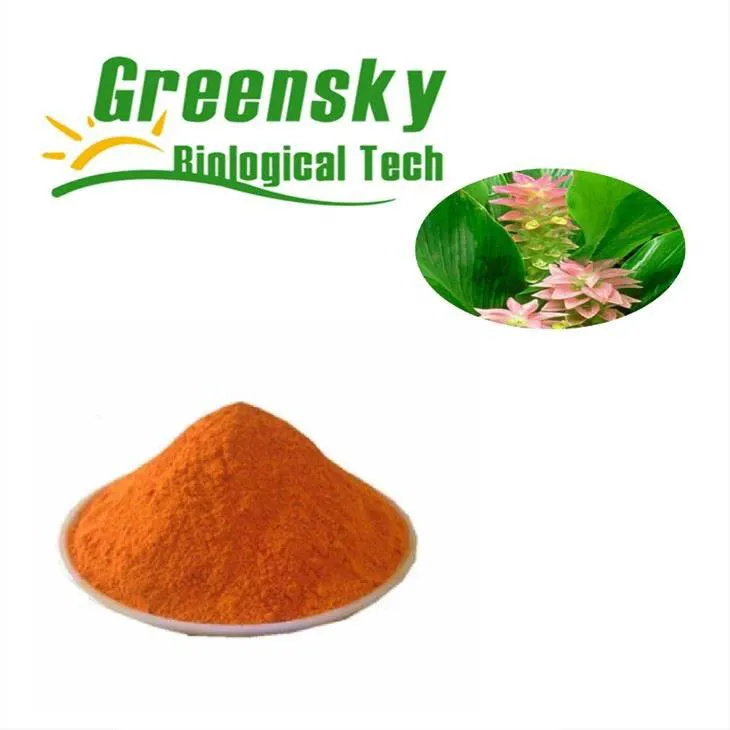- 0086-571-85302990
- sales@greenskybio.com
The best organic curcumin.
2024-12-02

1. Introduction to Organic Curcumin
Organic Curcumin has been steadily rising in popularity as a remarkable supplement. It is derived from the turmeric plant, which has a long history of use in traditional medicine, particularly in Asian cultures. Curcumin is the main bioactive compound in turmeric, known for its vibrant yellow color and a host of potential health benefits.

2. The Origin of Organic Turmeric
2.1 Geographical Origins
Turmeric is native to South Asia, specifically India. India has been the largest producer and exporter of turmeric for centuries. The warm and humid climate in many parts of India provides ideal conditions for turmeric cultivation. Other regions such as Southeast Asia, including Indonesia and Thailand, also grow turmeric. In recent years, there has been an increase in turmeric cultivation in parts of Africa and the Caribbean as well.2.2 Traditional Cultivation Practices
Traditionally, turmeric was grown in small - scale, family - run farms. Farmers would use age - old techniques, often relying on natural fertilizers like cow dung and compost. They would also practice crop rotation to maintain soil fertility. Watering was typically done using traditional irrigation methods, such as canals or water - carrying vessels, which were in tune with the local water availability and rainfall patterns.
3. Growth Conditions for Organic Turmeric
3.1 Soil Requirements
Organic turmeric thrives in well - drained, loamy soil. The soil should be rich in organic matter. A pH level between 5.5 and 7.5 is considered optimal. Sandy soils are not suitable as they do not retain enough moisture and nutrients. Clayey soils can be used if they are amended with organic matter to improve drainage.3.2 Climate Needs
Turmeric is a tropical plant and requires a warm and humid climate. Temperatures between 20 - 30°C (68 - 86°F) are ideal. It cannot tolerate frost and cold temperatures. High humidity levels, around 70 - 90%, are beneficial for its growth. Adequate rainfall or a reliable irrigation system is necessary, with an average annual rainfall requirement of about 1500 - 2500 mm.3.3 Pest and Disease Management in Organic Farming
In organic turmeric farming, chemical pesticides are not used. Instead, farmers rely on natural pest control methods. For example, they may introduce beneficial insects like ladybugs that feed on pests such as aphids. Crop rotation also helps in reducing pest and disease incidence. Neem oil, which has natural pesticidal properties, is often used to protect the plants from pests. For diseases, maintaining proper soil health and good air circulation around the plants can prevent many fungal and bacterial infections.
4. The Significance of Choosing Organic
4.1 Absence of Chemical Residues
One of the primary reasons for choosing organic curcumin is the lack of chemical residues. Conventional turmeric farming may use pesticides, herbicides, and fertilizers that can leave harmful residues on the turmeric rhizomes. These residues can potentially be harmful when consumed. Organic farming, on the other hand, strictly prohibits the use of synthetic chemicals, ensuring a cleaner and safer product.4.2 Environmental Sustainability
Organic farming practices are more environmentally friendly. They promote soil health by using natural fertilizers like compost and manure. This helps in maintaining soil structure and fertility in the long run. Organic farms also support biodiversity as they do not use chemicals that can harm beneficial insects, birds, and other wildlife. Additionally, organic farming reduces water pollution as there are no chemical run - offs from pesticides and fertilizers.4.3 Higher Nutritional Value
Some studies suggest that organic curcumin may have a higher nutritional value compared to its non - organic counterpart. Organic farming methods seem to enhance the production of certain secondary metabolites in turmeric, which may contribute to its antioxidant and anti - inflammatory properties. For example, the levels of curcuminoids may be higher in organically grown turmeric.
5. Research on the Effectiveness of Organic Curcumin in Treating Ailments
5.1 Joint Pain
Several research studies have investigated the role of curcumin in alleviating joint pain. Curcumin has anti - inflammatory properties, which can be beneficial for conditions like osteoarthritis and rheumatoid arthritis. In some clinical trials, patients who took curcumin supplements showed a reduction in pain and improved joint function. The anti - inflammatory action of curcumin is thought to be due to its ability to inhibit certain inflammatory mediators in the body.5.2 Digestive Disorders
Organic curcumin may also play a role in treating digestive disorders. It can stimulate the production of bile, which aids in digestion. In addition, its anti - inflammatory properties can be helpful for conditions like inflammatory bowel disease (IBD). Some studies have shown that curcumin can reduce inflammation in the gut and improve symptoms such as abdominal pain and diarrhea.5.3 Other Potential Health Benefits
- Cancer Prevention: There is some evidence suggesting that curcumin may have anti - cancer properties. It can potentially inhibit the growth of cancer cells and prevent the formation of tumors. However, more research is needed in this area. - Brain Health: Curcumin has been studied for its potential role in maintaining brain health. It may have antioxidant and anti - inflammatory effects in the brain, which could be beneficial for preventing neurodegenerative diseases such as Alzheimer's and Parkinson's. - Heart Health: Some research indicates that curcumin may improve heart health by reducing cholesterol levels, particularly LDL (bad) cholesterol. It may also have anti - platelet properties, which can help in preventing blood clot formation.
6. Tips on Ensuring You Get the Best - Quality Organic Curcumin
6.1 Look for Reputable Brands
When purchasing organic curcumin, it is essential to choose a reputable brand. Look for brands that have a good track record in the market, with positive customer reviews. Reputable brands are more likely to follow strict quality control measures during the production process.6.2 Check for Certifications
Check for organic certifications on the product. In the United States, look for the USDA Organic seal. In Europe, the EU Organic logo is a reliable indicator of organic authenticity. These certifications ensure that the product has been produced according to the strict organic standards set by the respective regulatory bodies.6.3 Consider the Form of Curcumin
Curcumin is available in different forms, such as capsules, tablets, and powders. The form you choose may depend on your personal preference and how you plan to consume it. However, some forms may be more bioavailable than others. For example, curcumin in the form of a lipid - based supplement may be better absorbed by the body compared to a simple powder form.6.4 Read the Ingredient List
Always read the ingredient list carefully. A high - quality organic curcumin product should have minimal additives. Avoid products that contain a large number of artificial colors, flavors, or preservatives. The ingredient list should clearly state that the curcumin is from organic sources.FAQ:
What is organic curcumin?
Organic curcumin is a compound derived from organic turmeric. Turmeric is a plant, and curcumin is the main bioactive component in it. Organic curcumin is produced from turmeric that is grown without the use of synthetic pesticides, fertilizers, or genetically modified organisms (GMOs).
What are the growth conditions for organic turmeric?
Organic turmeric is typically grown in well - drained soil with good sunlight exposure. It requires a warm and humid climate. Organic farming practices for turmeric involve using natural fertilizers like compost and manure, and natural pest control methods such as companion planting and biological pest control, instead of synthetic chemicals.
Why is choosing organic curcumin important?
Choosing organic curcumin is important for several reasons. Firstly, it reduces the exposure to potentially harmful synthetic chemicals that may be present in non - organic products. Secondly, organic farming practices are more environmentally friendly. Also, some people believe that organic curcumin may have a higher nutrient content due to the natural growth conditions of the turmeric plants.
How is organic curcumin effective in treating joint pain?
Research suggests that curcumin has anti - inflammatory properties. In the case of joint pain, it can help reduce the inflammation in the joints. It may also interact with certain molecules in the body that are involved in pain signaling, thereby potentially reducing the perception of pain. However, more research is still needed to fully understand its mechanism and effectiveness in treating joint pain.
Can organic curcumin help with digestive disorders?
Yes, it can. Organic curcumin may help with digestive disorders. It can stimulate the production of bile, which is important for digestion. It also has antioxidant and anti - inflammatory properties that can help soothe the digestive tract. For example, it may be beneficial for people with conditions like indigestion or inflammatory bowel disease.
Related literature
- Title: The Efficacy of Organic Curcumin in Anti - Inflammatory Therapies"
- Title: "Organic Curcumin and Digestive Health: A Comprehensive Review"
- Title: "Growth Conditions of Organic Turmeric: Implications for Curcumin Quality"
- ▶ Hesperidin
- ▶ Citrus Bioflavonoids
- ▶ Plant Extract
- ▶ lycopene
- ▶ Diosmin
- ▶ Grape seed extract
- ▶ Sea buckthorn Juice Powder
- ▶ Fruit Juice Powder
- ▶ Hops Extract
- ▶ Artichoke Extract
- ▶ Mushroom extract
- ▶ Astaxanthin
- ▶ Green Tea Extract
- ▶ Curcumin
- ▶ Horse Chestnut Extract
- ▶ Other Product
- ▶ Boswellia Serrata Extract
- ▶ Resveratrol
- ▶ Marigold Extract
- ▶ Grape Leaf Extract
- ▶ New Product
- ▶ Aminolevulinic acid
- ▶ Cranberry Extract
- ▶ Red Yeast Rice
- ▶ Red Wine Extract
-
Purple Sweet Potato Extract
2024-12-02
-
Grape Leaf Extract
2024-12-02
-
Black Rice Extract
2024-12-02
-
Green Tea Extract
2024-12-02
-
Hawthorn Extract
2024-12-02
-
Hedyotis Diffusa Extract
2024-12-02
-
Horse Chestnut Extract
2024-12-02
-
Lycopene
2024-12-02
-
Beetroot juice Powder
2024-12-02
-
Hesperidin
2024-12-02





















